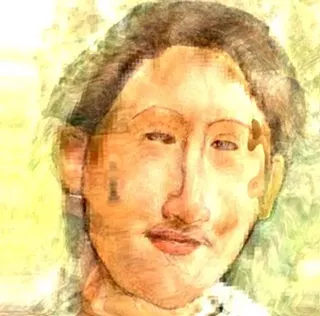That adaptation opened last weekend, and McGrath has done a magnificent job of transforming the bloated poem into a successful theatrical piece, full of story, distinct characterizations, movement, the simplest of visual illusions and live music. Yet the play, like Endymion himself, does meander through a series of discrete scenes united only by the theme of love. Through much of the evening, you wonder how it can all possibly coalesce. The stories ultimately do hold together, if you're willing to make the connections yourself--that is, if you're willing to surrender to the genre needs of what might be called a picaresque romance, rather than be led beat by beat through a linear plot.
After confessing his visions of goddess-love to his sister, Peona, Endymion sets off on a quest that introduces him to many of the great (and often thwarted) couples of Greco-Roman mythology: love goddess Venus and pretty-boy Adonis, river god Alpheus and water nymph Arethusa, the triangle of enchantress Circe and fisherman Glaucus and nymph Scylla. Endymion is destined to couple with moon goddess Diana (her day job is goddess of the hunt), but first, he and we must learn the stories of lovers who have come before.
McGrath's Endymion calls to mind another recent play drawn from the myths: Mary Zimmerman's Metamorphoses, retelling, in the modern vernacular, stories from Ovid in which love troubles literally morph people into a different state--birds or trees or golden statues. Zimmerman's play, which the UA memorably produced here three years ago, can be terribly moving in its account of the funny and frightening transformative power of love (to quote my own review). Endymion is ultimately less moving than Metamorphoses, because it's less about love than about language--beautiful, elevated, gorgeously delivered language, but still a description rather than a manifestation of love.
Don't blame this on McGrath's adaptation or the cast he directs. As with Rogue Theatre's stage treatment of James Joyce's The Dead last season, his mission is fidelity to the tone and language of the original work, adding theatrical elements that enhance the comprehension and color of those words without usurping their primacy. If the play stands at some distance from the subject and the characters, that's because McGrath is trying to be true to Keats.
Even so, this is no mere poetry reading. It's a fully staged production, with a 16-member cast portraying multiple characters, accompanied by a four-member musical ensemble. (Music director Harlan Hokin has assembled an evocative mélange of French Impressionist pieces, folk music from the eastern Mediterranean and original items, some of which are sung by the actors.) The gods are masked, and lounge above the action. At stage level, the mortals cavort or freeze in place; the water god chases the water nymph, each trailed by a long blue streamer to suggest their natural element; women ululate with joy during a festival; and, as is the norm at Rogue, the actors and musicians never leave our sight: When they are not performing, they move to the side and become spectators like the rest of us.
McGrath, something of a Brechtian, creates illusion without bothering to conceal any stage trickery. We know this is a work of theater, yet we buy into it despite ourselves. Even the figures within the play, without breaking character, are up front about putting on a show. Toward the end, Diana appears to Endymion disguised as a young woman from India; the Indian is a human marionette, and it's Diana who pulls the strings and does the talking in full view of the audience but not, apparently, the smitten Endymion.
Still, and again, this production is primarily about the text; its success hinges on the effective delivery of the words, and for the most part, the text is presented with loving care. There is some tension, though, in conflicting styles of delivery. McGrath, who serves as a narrator, and several other actors employ a fairly elevated style, removed from everyday conversation yet, because of that, more sensual and beguiling. Cynthia Meier (Diana), David Alexander Johnston (Cupid), Susan Arnold (Circe) and David Morden (Glaucus) are among those who, like McGrath, accomplish this well. A few other actors, though--notably Christopher Burnham as Endymion and Caroline Murphy as his sister--take a more colloquial approach. Their delivery winds up a little faster and a lot flatter in comparison, and this is the one point at which the production doesn't quite hold together.
Nevertheless, McGrath and company conjure a great deal of theatrical magic here. "A thing of beauty is a joy forever" is the refrain running through the play; a live performance can hardly last forever, but Rogue Theatre has at least given us a thing of beauty.








